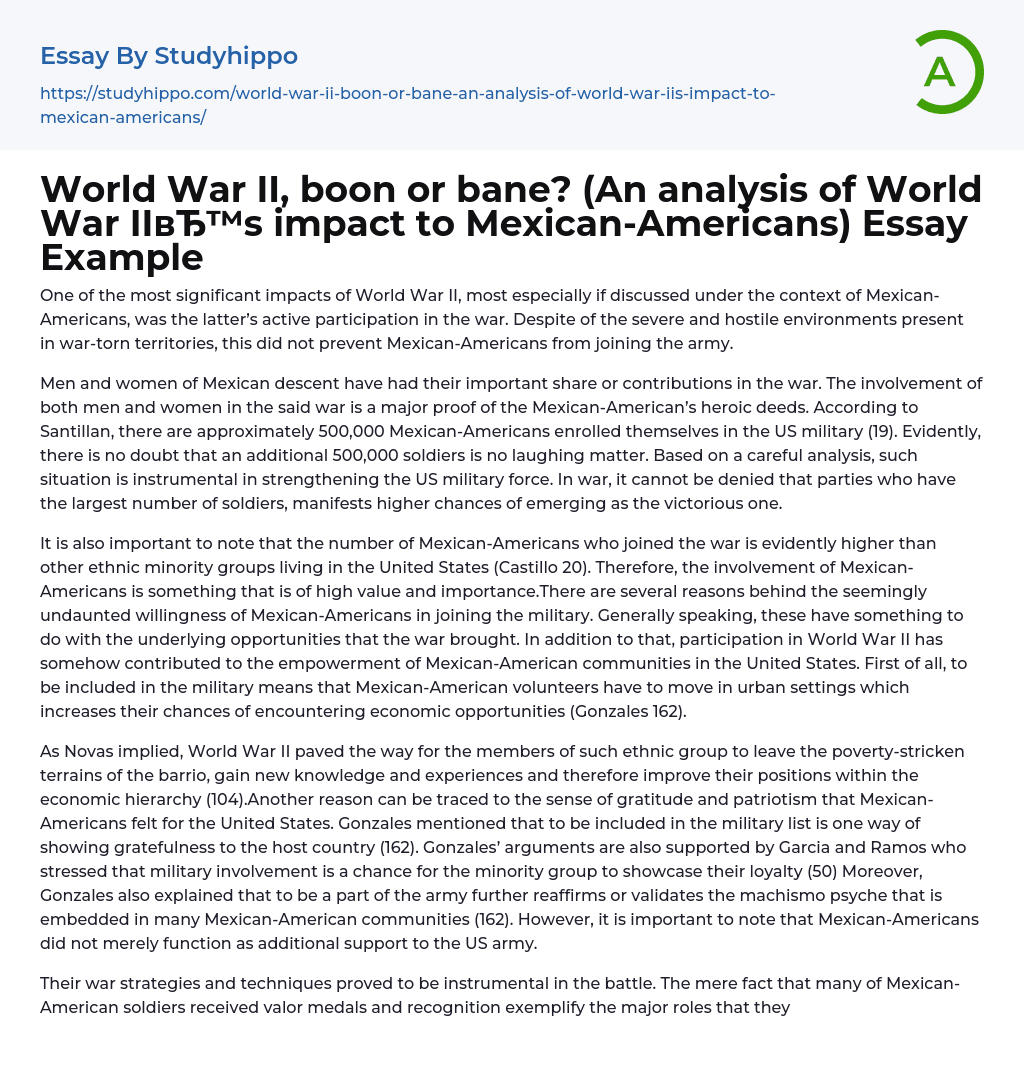

Mexican-Americans in WWII: Active Participation Despite Hardships
During World War II, Mexican-Americans played a crucial role by actively participating in the war despite the challenging conditions. Men and women of Mexican heritage both made notable contributions to the war effort.
Both men and women from Mexican-American backgrounds actively participated in the war, which serves as compelling evidence of their heroic actions. According to Santillan (19), approximately 500,000 Mexican-Americans willingly enlisted in the US military. This considerable number of soldiers played a crucial role in enhancing the strength of the US armed forces. In times of war, it is undeniable that larger factions have greater chances of achieving victory. Importantly, the number of Mexican-Americans who actively joined the war surpasses that of other ethnic minority groups living in the United States (Castillo 20).
The participation of Mexican-Americans in the military is highly significant and important, as i
...t brings various opportunities that stem from involvement in war. Their contribution to World War II has also served to empower Mexican-American communities within the United States. By joining the military, Mexican-American volunteers have a chance to relocate to city areas, which enhances their chances of encountering economic prospects (Gonzales 162). Novas argues that World War II allowed members of this ethnic group to escape impoverished neighborhoods, gain new knowledge, and improve their social and economic status (104). Another factor driving their involvement can be attributed to the gratitude and patriotism felt by Mexican-Americans towards the United States. According to Gonzales, serving in the military serves as a way for them to express appreciation towards their host country (162).
Garcia and Ramos, as well as Gonzales (50), support Gonzales' arguments that military involvement provides an opportunity for minority groups t
show their loyalty. Gonzales also explains that joining the army further validates the machismo psyche prevalent in many Mexican-American communities (162). However, it is important to note that Mexican-Americans did not serve merely as additional support to the US army. Their war strategies and techniques were essential to the battle. The fact that many Mexican-American soldiers received valor medals and recognition demonstrates their significant roles in World War II (Gonzales 162). On the other hand, although the Second World War had a harmful impact on many, including in the United States, it also sparked cultural and social awareness among Mexican-Americans.
The military engagement of Mexican-Americans facilitated their interaction with fellow individuals from the same ethnic background. Due to the shared experiences and historical origins, a sense of belongingness and social cohesion was cultivated. Additionally, the focus on developing war-related skills within the military helped alleviate discrimination and racism. Consequently, this situation greatly influenced the lives of numerous Mexican-American soldiers, providing them with an opportunity to reaffirm their identities and cultural practices. Hence, it can be argued that one of the significant impacts of World War II on Mexican-Americans was the chance to confront challenges related to reconstructing and forming their identities.
Furthermore, the G.I Bill, also known as the Servicemen’s Readjustment Act of 1944 (Metller 16), played a crucial role in improving the lives of Mexican-Americans by empowering veterans to purchase homes and pursue higher education degrees (Castillo 54). The substantial number of Mexican-American youth who served in World War II took advantage of the educational opportunities provided by the G.I Bill, resulting in a significant boost to their involvement in American society.
The rise in the number
of Mexican-Americans attending schools and universities led to a gradual resolution of issues related to student discrimination and segregation (Meier ; Gutierrez 252). Their exposure to diverse theories, ideas, and principles also contributed to the improvement of their self-awareness and activism (McKenzie 93). Furthermore, the growing presence of educated Mexican-Americans created more opportunities for them in the labor market beyond traditional blue-collar jobs. However, it is important to acknowledge that World War II had both positive and negative effects on the economic status of Mexican-Americans. While it provided greater advantages for some individuals, it widened the gap between middle-class and working-class Mexicans. The poorest individuals remained at the bottom rung on the economic ladder, and many were not enticed by the prospect of enduring subjugation despite gaining economic benefits (Hartman 37).
Additionally, the US' Bracero program resulted in various job opportunities that placed Mexican-American workers in difficult positions (Menchaca 124). World War II had both positive and negative effects on Mexican-Americans. On one hand, it drastically transformed their ideology, politics, and culture and redefined their societal roles. However, it also caused internal conflicts and divisions within the Mexican-American community, which continue to challenge their social cohesion.
- Values of Life essays
- Ethical dilemma essays
- Normative Ethics essays
- Virtue Ethics essays
- Belief essays
- Deontology essays
- Moral essays
- Virtue essays
- Work Ethic essays
- Feminism essays
- Animal Rights essays
- Animal Testing essays
- Bullying essays
- Abortion essays
- Abuse essays
- Immigration essays
- Poverty essays
- Human Rights essays
- Inequality essays
- Violence essays
- Torture essays
- Crash essays
- Assault essays
- Racism essays
- Prejudice essays
- Controversial Issue essays
- Cyber Bullying essays
- Women's Suffrage essays
- Women'S Rights essays
- Women Empowerment essays
- Sojourner Truth essays
- Bullying In Schools essays
- Pro Choice essays
- Pro Life essays
- Should Abortion Be Legal essays
- Against abortion essays
- Abortion Debate essays
- Abuse Support essays
- Child Abuse essays
- Alcohol Abuse essays
- Physical Abuse essays
- Sexual Abuse essays
- Substance Abuse essays
- Migration essays
- Human Migration essays
- Illegal Immigration essays
- Immigrants essays
- Refugee essays
- Overpopulation essays
- Homelessness essays



